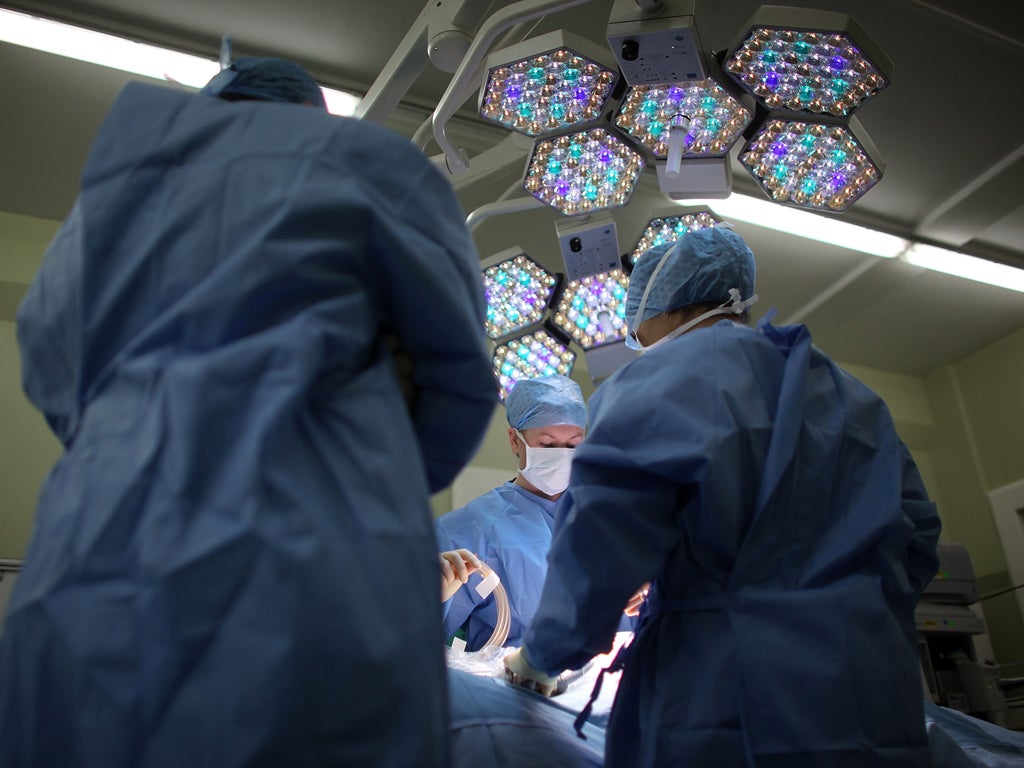If I can fall through the cracks of the NHS, with my gob and sharp elbows, what hope for the meek?
Plus: Thanks to the Vatican for clarifying, I know just what to pack in the handcart; Jeremy Deller’s Venice exhibition is seedy and real, so who wants to fight about it?


Your support helps us to tell the story
From reproductive rights to climate change to Big Tech, The Independent is on the ground when the story is developing. Whether it's investigating the financials of Elon Musk's pro-Trump PAC or producing our latest documentary, 'The A Word', which shines a light on the American women fighting for reproductive rights, we know how important it is to parse out the facts from the messaging.
At such a critical moment in US history, we need reporters on the ground. Your donation allows us to keep sending journalists to speak to both sides of the story.
The Independent is trusted by Americans across the entire political spectrum. And unlike many other quality news outlets, we choose not to lock Americans out of our reporting and analysis with paywalls. We believe quality journalism should be available to everyone, paid for by those who can afford it.
Your support makes all the difference.A report this week finds that patients who have their operations at the end of the week are almost 50 per cent more likely to die than those who have surgery at the beginning. What a horrific piece of news for anyone awaiting an op, either for themselves or a loved one. The author of the report says the cause of this is “patients undergoing surgery on Fridays who are forced to recuperate over the weekend when senior doctors are often unavailable, nursing staff are fewer and testing services are reduced”.
I’d suggest that “deaths are also likely due to patients being sent home on Friday night or Saturday mornings post-ops without any concern for what is waiting for them at the other end. Or for whether they understand their vital post-op medication, or have the correct pills, or have anyone to fetch their prescription on Sunday for them. Or understand the complex weekend emergency procedure if they’re suddenly ill, which has a different address and phone number. Or have any means of getting to this random address if need be. Or whether anyone at the hospital has checked that the weekend district nurse has genuinely been informed that the patient exists, or have they just fallen through a crack in the system and could die?”
All these questions and more presented themselves to me recently when a friend had her breast removed on a Thursday afternoon and by Saturday breakfast time was – according to the hospital – apparently ready for home. I called the nurse’s station a couple of times to clarify details of how to collect this precious, rather terrifying cargo, and ask what aftercare she would need. I was instructed to call the patient’s in-bed payphone. But I couldn’t do that because the patient hadn’t quite got to grips with using the phone thanks to the more pressing matter of having her breast removed. She hadn’t had a lot of time to peruse the manual. The patient’s fault really, one supposes.
I brought her home on Saturday morning clutching a paper bag with pills in the bottom and an instruction leaflet for their dosages. The pills in the bag did not match the pills on the sheet. My friend had drains in a wound that neither of us understood. It was malfunctioning in a frightening way. Neither of us knew who to inform about this aside from “not the hospital”, as it was the weekend. Many phone calls later, I was palmed off on a district nurse who confessed she had no record of us and no routine visit had been scheduled.
When I find myself in situations like this, me with my sharp elbows and all my gob, managing to fall through a crack in the system and end up scared and hope-free, I always, always think: “If this is what happened to me, what is happening to other meeker people?” I remember sitting on my friend’s bed on the Saturday evening thinking: “Is she ok? Or is she going to die?”
I believe and support my country’s need for the NHS, and stand by the fact that there are some brilliant, caring individuals working within it, but I won’t champion all the NHS’s systems or praise all of its care-givers in a blanket fashion. Change needs to happen. That figure again: you are almost 50 per cent more likely to die in an operation at the end of the week than one that takes place on Monday. Faced with facts like this, who from now on will accept a Thursday or Friday operation? Those who are desperate, quick to defer to doctors, and those who don’t read newspapers. Meanwhile, the chattering classes will trumpet loudly how perfect the NHS is, then when push comes to shove go private.
Yay! I know just what to pack into the handcart
Delighted to have it confirmed that I am going to hell. Hooray! It’s good to know what to pack. The Vatican has clarified this week that non-believers are still off to the fiery furnaces, despite Pope Francis saying – in that affable way he says stuff – that non-believers could be saved through Christ if they do good. Oh, drat. I like the “doing good and being nice, Kumbaya” parts of the Bible, but there’s a lot of Game of Thrones-style folklore and personal admin I can’t quite get along with. Off to hell I go in a handcart, with a load of gays, merry-divorcees and Tracey Emin holding forth on her abortions. I know who’s got the best deal.
It’s seedy and real, and I love it. Now let’s fight
One of my very favourite things about modern art is how furious it makes some people. Fuming – swivel-eyed, even – about all the reasons this abomination should never have existed, not be permitted and, despite having shocked them, shouldn’t be acknowledged as shocking. I'd happily skip the exhibition and watch families fighting in the Tate Modern tea shop about “what is art”.
So, aggravatingly for me, people are not quite livid enough yet about Jeremy Deller’s “aggressive” anti-establishment exhibition made to represent Britain at the Venice Biennale. Or the art “Olympics” as some people see it. Deller’s six-room exhibition, titled “English Magic”, opens with a giant mural of a hen harrier clasping a red Range Rover, representing the 2007 allegations that Prince Harry shot two rare birds at Sandringham. Other magical English elements include portraits of the former head of MI6, Sir Richard Dearlove and the dead government scientist Dr David Kelly. Elsewhere, the tax haven of Jersey is on fire, and Victorian social reformer William Morris has returned from the dead to hurl Roman Abramovich’s vast yacht, Luna, into the sea.
I adore this seedy, witty, wholly real take on modern England. Just do me a favour and fight with me about it.
Join our commenting forum
Join thought-provoking conversations, follow other Independent readers and see their replies
Comments